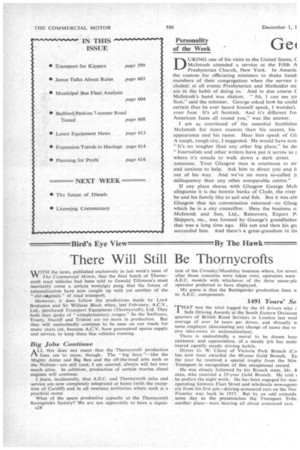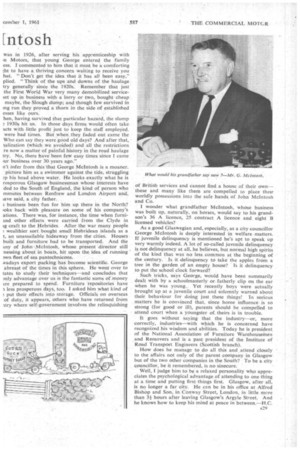Personality of the Week
Page 30

Page 31

If you've noticed an error in this article please click here to report it so we can fix it.
Gei
[ntosh
DURING one of his visits to the United States, C McIntosh attended a service at the Fifth A Presbyterian Church, New York. In Arneric. the custom for officiating ministers to shake hand: members of their congregation when the service ii eluded: at all events Presbyterian and Methodist mi are in the habit of doing so. And in due course C McIntosh's hand was shaken. " Ah, I can see yo Scot," said the minister. George asked how be could certain (has he ever heard himself speak, I wonder). your face. It's all Scottish. And it's different fro American faces all round you,' was the answer.
I am as convinced of the essential Scottishnt McIntosh for more reasons than his accent, his appearance and his name. Hear him speak of Gh A tough, rough city, I suggested. He would have nom "It's no tougher than any other big place," he del "Journalists and other writers have put it across as z where it's unsafe to walk down a dark street. nonsense. Your Glasgow man is courteous to str and anxious to help. Ask him to direct you and h out of his way. And we've no more so-called js delinquency than any other comparable centre."
If any place shares with Glasgow George Mcli allegiance it is the bonnie banks of Clyde, the river he and his family like to -sail and fish. But it was alv Glasgow that his conversation returned—to Glass which he is a city councillor. Here the business 0 McIntosh and Son, Ltd., Removers, Export P. Shippers, etc., was formed by George's grandfather that was a long time ago. His son and then his gri succeeded him. And there's a great-grandson in tin
was in 1926, after serving his apprenticeship with ,n Motors, that young George entered the family ess. I commented to him that it must be a comforting tht to have a thriving concern waiting to receive you hat. "Don't get the idea that it has all been easy," plied. "Think of the ups and downs of the haulage try generally since the 1920s, Remember that just the First World War very many demobilized serviceset up in business with a lorry or two, bought cheap maybe, the Slough dump; and though few survived in Ing run they proved a thorn in the side of established esses like ours.
hen, having survived that particular hazard, the slump : 1930s hit us. In those days firms would often take acts with little profit just to keep the staff employed. were bad times. But when,they faded out came the Who can say they were good old days? And after that, • lalization (which we avoided) and all the restrictions re now a matter of painful history in the road haulage try. No, there have been few easy times since I came iur business over 30 years ago."
n't infer from this that George McIntosh is a moaner. picture him as a swimmer against the tide, struggling .:p his head above water. He looks exactly what he is rosperous Glasgow businessman whose interests have ded to the South of England, the kind of person who mmutes between Renfrew and London Airport and, rave said, a city father.
s business been fun for him up there in the North? loks back with pleasure on some of his company's ations. There was, for instance, the time when furniand other effects . were carried from the Clyde in ig craft to the Hebrides After the war many people : wealthier sort bought small Hebridean islands as a t, an unassailable hideaway from the cities. Houses built and furniture had to be transported. And the any of John •McIntosh, whose present director still -nessing about in boats, hit upon the idea of running ,wn fleet of sea pantechnicons.
Nadays export packing has become scientific. George abreast of the times in this sphere. He went over to tates to study their techniques—and concludes that mly advantage over us is the fantastic sums of ,money are prepared to spend. Furniture repositories have 1. less prosperous days, too. I asked him what kind of put their effects into storage. Officials on overseas of duty, it appears, others who have returned from itry where self-government involves the relinquishing
of British services and cannot find a house of their own— these and many like them are compelled to place their worldly possessions into the safe hands. of Jahn McIntosh and Co.
I wonder what grandfather McIntosh, whose business was built up, naturally, on horses, would say to his grandson's 36 A licence, 25 contract A licence and eight B licensed vehicles?
As a good Glaswegian and, especially, as a city councillor George McIntosh is deeply interested in welfare matters. If juvenile delinquency is mentioned he's apt to speak up very warmly indeed. A lot of so-called juvenile delinquency is not delinquency at all, he believes, but normal high spirits of the kind that was no less common at the beginning of the century. Is it delinquency to take the apples from a tree in the garden of an empty house? Is it delinquency to put the school clock forward?
Such tricks, says George, would have been summarily dealt with by a schoolmasterly or fatherly clip on the ear when he was young.. Yet recently boys were actually brought' up at a juvenile court and solemnly warned about their behaviour for doing just these things! In serious matters he is convinced that, since home influence is so strong (for good or ill), parents should be compelled to attend court when a youngster of theirs is in trouble.
It goes without saying that the industry—or, more correctly, industries—with which he is concerned have recognized his wisdom and abilities. Today he is president of the National Association of Furniture Warehouseinen and Removers and is a past president of the Institute of Road Transport Engineers (Scottish branch).
How does he manage to do all this and attend closely to the affairs not only of the parent company in Glasgow but of the two other companies in the South? To be a city councillor, be it remembered, is no sinecure.
Well, I judge him to be a relaxed personality who appreciates the psychological advantage of attending to one thing at a time and putting first things first, Glasgow, after all, is no longer a far city. He can be in his office at Alfred BishOp and Son, in Conway Street, London, in little mere than 34 hours after leaving Glasgow's Argyle Street. And he knows how to keep his mind at peace in between.—H.C.
































































































































